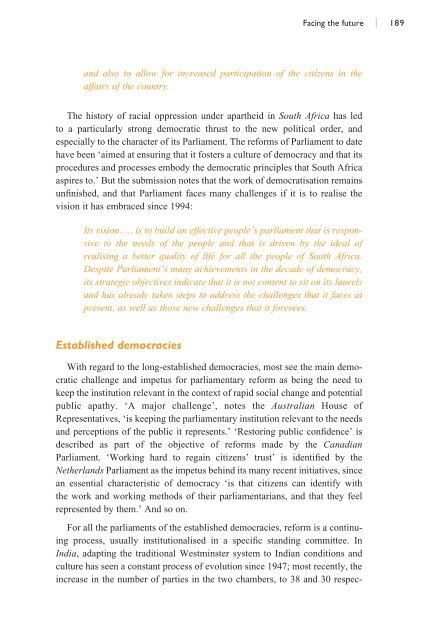PARLIAMENT AND DEMOCRACY - Inter-Parliamentary Union
PARLIAMENT AND DEMOCRACY - Inter-Parliamentary Union
PARLIAMENT AND DEMOCRACY - Inter-Parliamentary Union
Create successful ePaper yourself
Turn your PDF publications into a flip-book with our unique Google optimized e-Paper software.
and also to allow for increased participation of the citizens in the<br />
affairs of the country.<br />
The history of racial oppression under apartheid in South Africa has led<br />
to a particularly strong democratic thrust to the new political order, and<br />
especially to the character of its Parliament. The reforms of Parliament to date<br />
have been ‘aimed at ensuring that it fosters a culture of democracy and that its<br />
procedures and processes embody the democratic principles that South Africa<br />
aspires to.’ But the submission notes that the work of democratisation remains<br />
unfinished, and that Parliament faces many challenges if it is to realise the<br />
vision it has embraced since 1994:<br />
Its vision….. is to build an effective people’s parliament that is responsive<br />
to the needs of the people and that is driven by the ideal of<br />
realising a better quality of life for all the people of South Africa.<br />
Despite Parliament’s many achievements in the decade of democracy,<br />
its strategic objectives indicate that it is not content to sit on its laurels<br />
and has already taken steps to address the challenges that it faces at<br />
present, as well as those new challenges that it foresees.<br />
Established democracies<br />
Facing the future I 189<br />
With regard to the long-established democracies, most see the main democratic<br />
challenge and impetus for parliamentary reform as being the need to<br />
keep the institution relevant in the context of rapid social change and potential<br />
public apathy. ‘A major challenge’, notes the Australian House of<br />
Representatives, ‘is keeping the parliamentary institution relevant to the needs<br />
and perceptions of the public it represents.’ ‘Restoring public confidence’ is<br />
described as part of the objective of reforms made by the Canadian<br />
Parliament. ‘Working hard to regain citizens’ trust’ is identified by the<br />
Netherlands Parliament as the impetus behind its many recent initiatives, since<br />
an essential characteristic of democracy ‘is that citizens can identify with<br />
the work and working methods of their parliamentarians, and that they feel<br />
represented by them.’ And so on.<br />
For all the parliaments of the established democracies, reform is a continuing<br />
process, usually institutionalised in a specific standing committee. In<br />
India, adapting the traditional Westminster system to Indian conditions and<br />
culture has seen a constant process of evolution since 1947; most recently, the<br />
increase in the number of parties in the two chambers, to 38 and 30 respec-

















